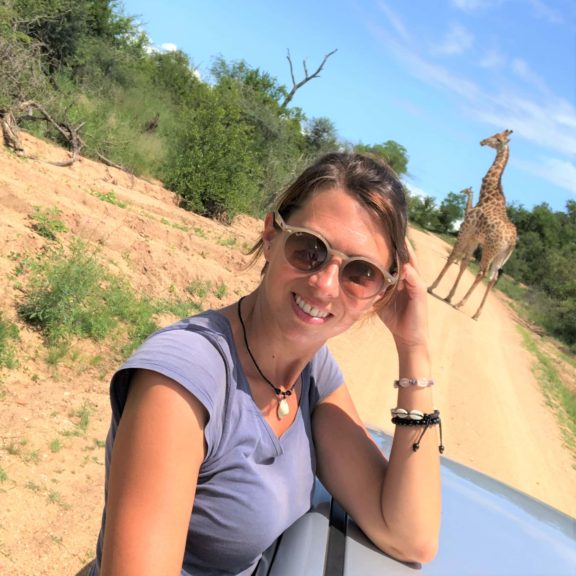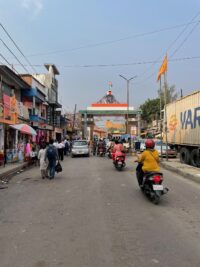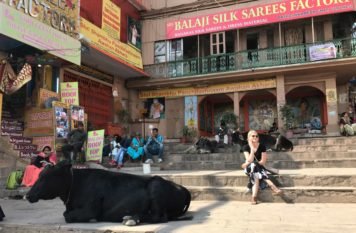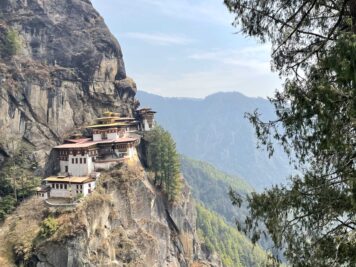We were in the northern reaches of Benin and thinking about our upcoming foray into Burkina Faso. Moving on: it’s not always an easy task, especially when you don’t speak French and until very recently you’ve never heard of the obscure town you are planning to go to in the first place and now you need to piece together a journey between some unknown destinations, and then communicate that plan – in French – to the people you hope will eventually take you there. And maybe you can’t even pronounce the names of the towns – maybe they are places like Koussoukoingou and Ouagadougou (really). But we are experts at this sort of thing now and by that I mean that at the very least we know we’ll get somewhere or other, and if we’re lucky, even before dark.
We were staying in a tiny village in an eco-lodge:

It’s built to resemble the local traditional houses called ‘tatas’ – clay buildings with round towers and thatched turrets:
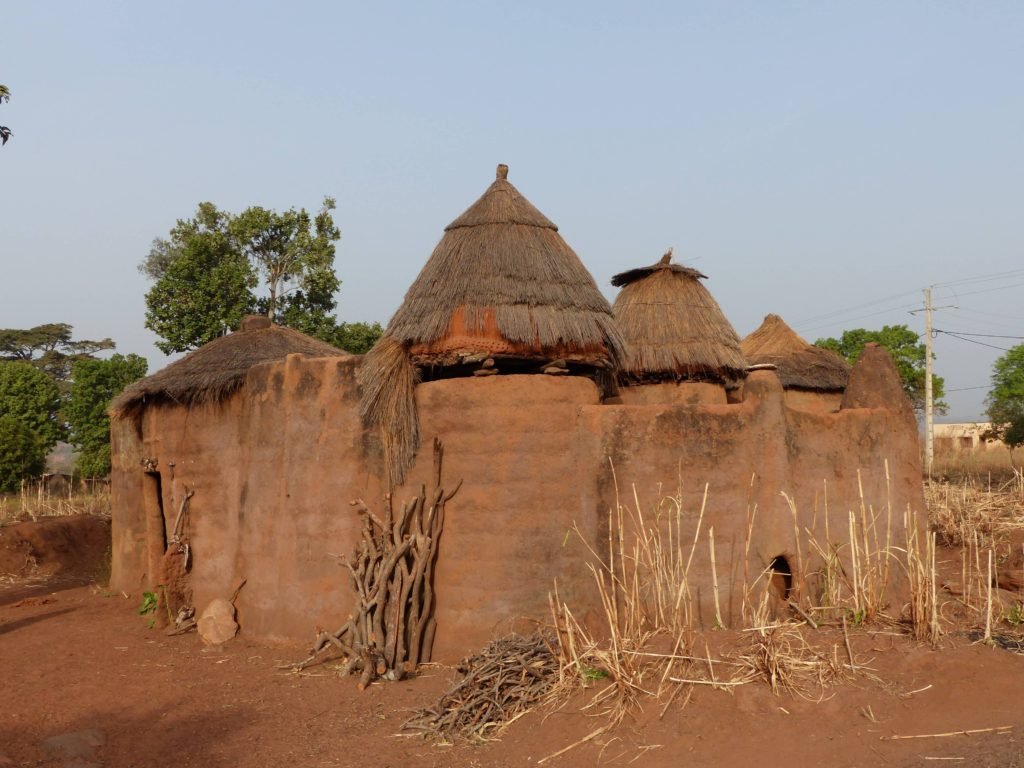
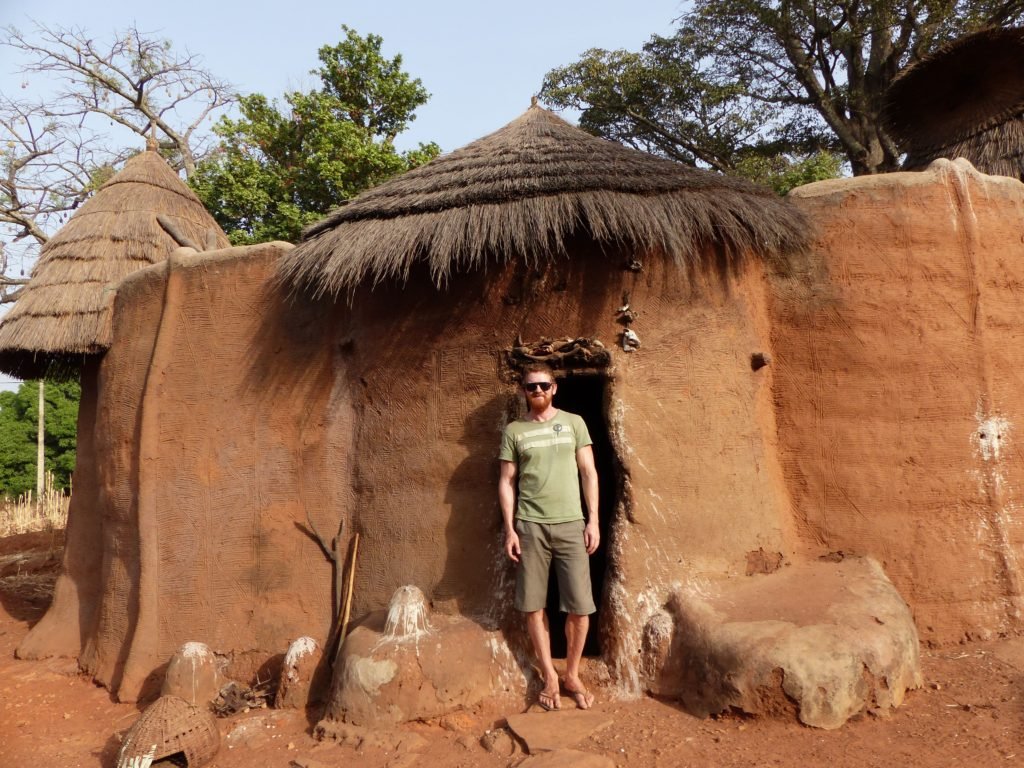
These countries we’re traveling in right now are small; when it comes to border-crossings we’re spoiled for choice with Togo on one side, Nigeria on the other, and Burkina Faso up above. We’d read that we could get our passports stamped in nearby Boukombe; then heading west, the next village we came to would actually be in Togo and we’d get our passports stamped again, there. Too easy. But, at dinner that night we met a couple of South African expats based in Nigeria, and found out that the Gendarmerie in Boukombe were no longer providing immigration services, and so, if we went that way we’d end up in Togo without the exit stamp from Benin. This threw a wrench into our plans. No big surprises there; and on the other hand, meeting the South Africans made for an interesting conversation about life in Lagos, and was one of those lucky cases of perfect timing.
So we decided to just go straight to Burkina Faso, without any extra country-hopping along the way. The South Africans were heading north in the morning, and we caught a ride with them. They had some errands to run – not just their own, but as happens sometimes for inscrutable reasons, other people’s as well – in this case the local police asked them to deliver some mail in the next town. So we went with them on the impromptu mail-run, and they dropped off the post and us in Tanguieta where we waited for a bush taxi to fill up, and head towards Burkina.
We weren’t sure what to expect from this border crossing. It’s a line on the map and nothing more; and we had only a vague idea of what lay on the other side of that line – some distance away, a town called Fada N’Gourma. But we were reasonably certain (and that’s good enough, isn’t it) that we could find the transport we needed along the way. We’d stay on the road until we reached Fada, and then get ourselves a room for the night to break up the long journey to Ouagadougou.
The mini-bus stopped in the last town in Benin with a police station, and we got our exit stamps. Then we drove for a long time, until we realised we’d crossed that line somewhere and were in Burkina Faso. Stopping at a police station at a crossroads the other passengers climbed out of the mini-bus and processed immigration, and so did we. Then we drove on, watching as the greener landscape gradually gave way to drier scrub as we drew closer to the Sahel; and churches gave way to mosques.
And then we were on our own. The Beninese vehicle we’d been traveling in dropped us off in a sort of marketplace/transport hub on the edge of the dusty frontier, and returned to Benin. We waited for a ride to Fada N’Gourma, and then we waited some more. There was a mini-bus heading that way and we knew it; the question was when, or if, it would ever depart.
There seemed to be a massive dispute amongst all the potential passengers, the driver, his various assistants, and many people who wanted to bring a lot of cargo further into the country on the roof of the bus. And I mean they wanted to bring everything but the kitchen sink – and then toss the kitchen sink on top for good measure.


We’ve seen a lot of creative transport solutions but the mini-busses of Burkina Faso take the prize for piling the most extreme amount of unlikely cargo possible on the roof of one moving vehicle. The whole system seems expressly designed by someone intent on vehicular manslaughter.


When we eventually did leave, we made only a few hundred meters before Oyv spotted a broken down mini-bus hunched on the side of the road, almost visibly exhausted under its cargo like an overburdened pack animal. He knew what this meant.
Oyv (groaning): Oh no….
Sar (brushing another passenger’s hair out of own eyes, distractedly wiping a baby’s nose): What? Not a dinner-break already?
Oyv: Worse. There’s a broken down mini-bus here.
Sar: Tell me there’s not a goat on top.
Oyv (climbing over three passengers in one seat, lunging for the door): We’re in for a wait – all that cargo is going up on our roof.
Sar (in resignation): That chicken just laid an egg on the front seat.
Oyv (in surprise): There’s only one chicken up there?



So, we waited, while the drivers transferred all the cargo – including several motorcycles, a goat, and two long wooden benches – onto the roof of our bus. Less than a kilometer after that, we picked up some more passengers. We were now around twenty-six people in a vehicle meant for half that many. It is a lesson in giving up on personal space. Passengers comfortably rested their arms on each others’ laps and folded their legs like an accordion alternating knees with the person opposite, until it was hard to tell which limb belonged to whom (except for ours of course, they are pretty obvious). People laughed and talked, shared food, casually fall asleep on their neighbor’s shoulder, and looked after each other’s kids. A baby seated on his big brother’s lap cried for his mother who was far in the back reaches of the bus, so his brother lifted him up and the other passengers literally crowd-surfed him back to his mom for a quick snack. You know, ‘It takes a village’, and all that.
And that’s just what went on inside the bus. The roof, atop the mountain of luggage always presents space for anyone willing to cling to the cargo and hold on for dear life – for starters, the conductor, who almost never gets a seat inside. But, if you’re thinking it must be a messy, violent free-for-all fight for a seat, you’d be mistaken. Chivalrous courtesy lives on; when we stopped yet again to pick up another woman waiting on the side of the road a gentlemanly passenger gave up his seat to her – and he himself disappeared out the window and climbed up onto the roof.
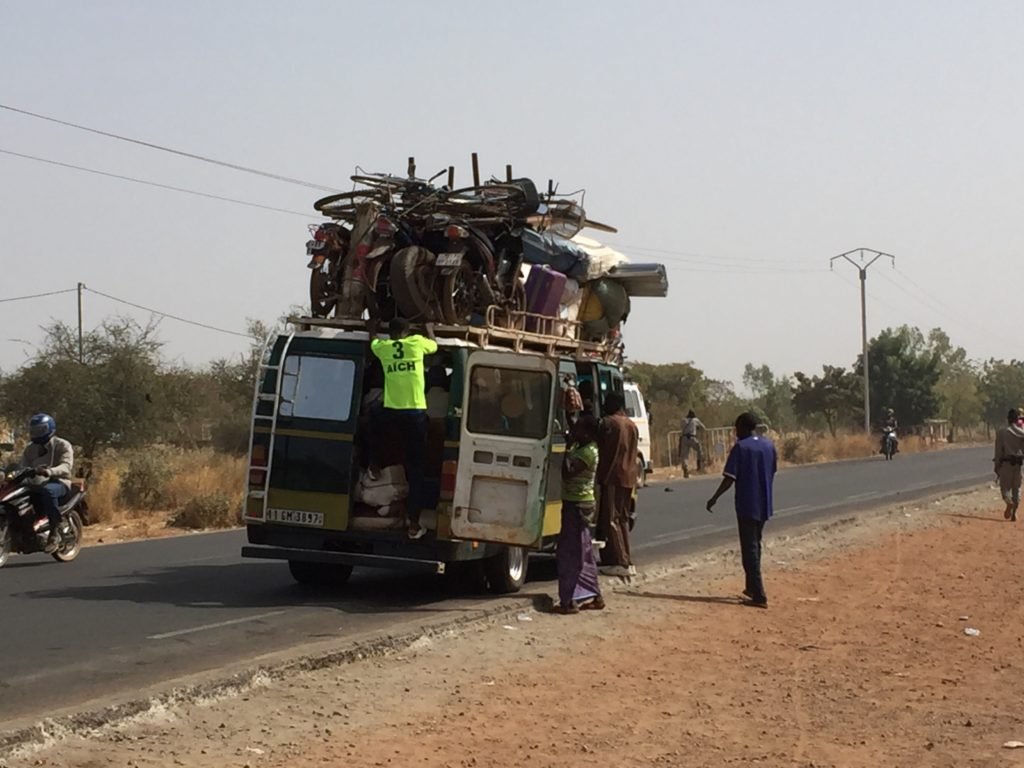
During all this, the long-suffering conductor/baggage logistics manager was sporting a secondhand t-shirt donated by some well meaning marathon-running-westerner. It said on the front ‘This seemed like a good idea 3 months ago’. The irony was lost on him but impossible for us to miss.
But we finally got to Fada. We staggered off our ride with relief, and set off into town on foot and found a room. It was late, it was dark, and we were tired and we were hungry so we ate some chicken off a grill in the street. We do that all the time and generally don’t have a problem. But on any given trip our stomachs are bound to fail us sooner or later, and this was our day of reckoning.
Sick for more than a day, we emphatically decided we never wanted to lay eyes on another chicken again, dead or alive. Which is too bad because chickens – hundreds of them, both dead and alive – are everywhere around here. Mostly loaded on the roofs of mini-busses awaiting transport, of course.

New Year’s 2018 came and went and we struggled out of bed and emerged blinking and fuzzy-mouthed, into the streets. So I don’t have much to say about Fada, having spent our entire visit there lying on the bathroom floor. Still feeling weak we caught a bus to Ouagadougou.
Eating our first meal in two days – not to mention our first meal in Burkina, since the previous one didn’t really count – we slowly revived. It was an inauspicious start to both Burkina Faso, and 2018. But a pizza (without any chicken on) in Ouagadougou does wonders for the spirits, and with a good night’s sleep we were ready for whatever Burkina had in store for us next.
Read More
Check out the rest of my stories from the road, for more of our adventures (and misadventures) in Benin and Burkina Faso.
